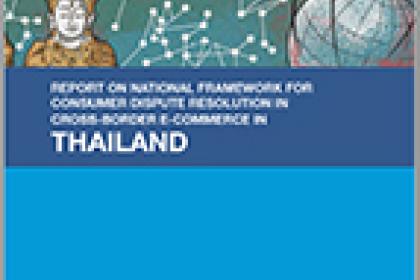Thailand has steadily advanced its transformation to a digital economy. In addition to the growth of domestic e-commerce, cross-border online transactions are also rapidly increasing. However, this expanding e-commerce landscape has led to an increase in the number of online disputes.
Given the rapid advances in technology and the growth of international e-commerce, online dispute resolution systems for consumers are becoming the most viable strategy for dealing with cross-border disputes. Furthermore, cross-border e-commerce dispute resolution may be critical to the inclusive growth of e-commerce in Thailand.
This study analyzes Thailand's national framework for resolving cross-border consumer disputes in e-commerce. It presents the current status of cross-border business-to-consumer (B2C) e-commerce in Thailand, including growth trends, market characteristics and actors, and existing operating models.
It also discusses existing legal and regulatory frameworks for resolving cross-border consumer disputes, with a focus on private international law and consumer protection law. Consider institutional frameworks such as judicial and administrative authorities. Finally, the report outlines the status, systems and approaches of cross-border consumer dispute resolution currently in place or under development, with a focus on their effectiveness and implementation.
The study concludes that there is room for improvement in Thailand's e-commerce consumer market, especially in terms of effective consumer protection. This gap needs to be aligned with the regional direction set by ASEAN, which emphasizes the importance of strong consumer protection laws. Additionally, the report shows that Thailand's consumer legal framework is fragmented, with numerous overlapping laws, institutions and organizations providing alternative dispute resolution mechanisms. Several civilian mechanisms have proven effective.
Thailand has the potential to further foster competition between private sector operators, especially online platforms, in providing ODR services to consumers. Regulatory responsibility for these private ODRs may be delegated to the Consumer Protection Commission Secretariat or the Electronic Trading Development Authority.
This report was prepared in the context of the UNCTAD Technical Cooperation Project.Providing digital transaction infrastructure and online dispute resolution to consumers as a means to improve international trade and e-commerce”.
This report provides policymakers with practical recommendations to help improve cross-border B2C consumer dispute resolution and provides advice to the OCPB on the practical design and updating of ODR platforms.


